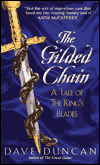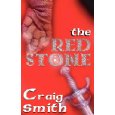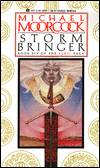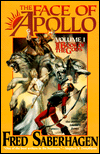
The Gilded Chain, by Dave Duncan
Book Review by Fraser Ronald
Have you read this book?
Imagine that Sir Thomas More had not only lived as a master swordsman, but that he had never needed to choose sides in Henry VIII's "Great Cause". If you can wrap your head around that, and if it sounds intriguing, you, like me, will enjoy the Gilded Chain. Dave Duncan's swashbuckling tale of master swordsmen, magically bound to serve as bodyguards and protectors, is set in a world much like Renaissance Europe, with obvious similarities to Henry VIII's England.
The hero of The Gilded Chain is Durendal, one of the King's Blades. The King's Blades are young men who have trained relentlessly for years at a place called Ironhall, and graduation means having a sword plunged into one's heart which then magically binds one to a ward. A King's Blade (or a private Blade for that fact) does not need sleep, and is driven by his binding to always protect his ward.
Durendal is the name of a great Blade hero, and the book's hero is originally chided for taking such a name. He proves, however, as capable as the previous Durendal. He also proves himself very much akin to the Thomas More of England's history. He is honest, sometimes to a fault, and loyal, even when it means denying a king's wish. He is an intelligent--even wise--courageous and unswervingly loyal duelist and vassal. Ambrose IV's great cause is much different from Henry VIII's in that it does not force his chancellor away from him, but actually draws him closer.
This book is made up of at least four stories, all from different periods in Durendal's life, rather than a single, cohesive narrative. There is also a slight chronological shift; one of the stories is laid over the others, which may bother some readers. I had no problem with this, but I have spoken to others who despise this technique. Chronological fluidity is something that is common in Canadian literature, so maybe I'm just more accepting of it.
This book has been called wonderful swashbuckling fiction. I wouldn't argue that it's wonderful, I wouldn't argue that it's swashbuckling--and I am certainly not going to argue that it's fiction--but I would argue that it is much more about political intrigue. I would add socio-political to any trite genrefictation of this book. If forced at swordpoint to label it, I would call it swashbuckling, socio-political, fantasy fiction.
And unlike many other books, while this is part of a series, it is a stand-alone novel. There are other King's Blades novels, and they are all tied together, but this book stands completely alone. It is complete, not only in the sense that one need not read any other book to understand or follow it, but also in the sense that it lacks nothing.
The setting of this book is exceptional in its realization. Of course, Mr. Duncan could easily have mapped much of our real world onto his book. It seems obvious from where much of his inspiration sprang. However, one need not understand Renaissance Europe to understand the setting. Mr. Duncan admirably walks the reader through the important facets of this world, teaches us about its politics, its borders and its concerns, much in the same way young Durendal is taught all these things in Ironhall.
And the characters are wonderful. While the king in this novel is often annoying, Mr. Duncan's portrayal of him is very refreshing. This is no stereotypical despot. Ambrose IV is both stubborn and open-minded. He has moments of lechery mixed with spans of nobility. He is both pragmatic and ideological. He is, in the end, a perfect rendition of a real man and a real king.
All the characters in this novel, if they are given the time, prove as well-rounded and complete as Ambrose. Durendal is an excellent example. Another author might have let this character be the hero everyone thinks him to be. He is a man of principle and honour who sometimes despises those very character traits in himself. This is a man riddled with self-doubt while projecting utmost confidence. As I mentioned earlier, this is the Man for all Seasons writ large with a sword at his side.
If you are looking for Three Musketeers-type swashbuckling, there is some of that here, but there is more Man in the Iron Mask (and I'm not referring to the movie, but the book by Alexander Dumas). This book focuses on politics and motivations as much as it does on swordplay. It reveals battles of wits and souls as much as it does swords.
I would enthusiastically recommend this book to any fan of either action or fantasy fiction. This is mature, considered fantasy that retains the heady excitement and thrills of sword and sorcery pulps. Everything here is consistent, from the rules governing the Blades to the rules governing magic. And this is no tale with happy endings. While the fates of a few characters are, in fact, happy, there are many more that are sad. I would suggest that this is adult fantasy, perhaps not well-suited for less mature readers. Still, if you enjoy good, lively, well-considered fantasy, this book should not disappoint.
The hero of The Gilded Chain is Durendal, one of the King's Blades. The King's Blades are young men who have trained relentlessly for years at a place called Ironhall, and graduation means having a sword plunged into one's heart which then magically binds one to a ward. A King's Blade (or a private Blade for that fact) does not need sleep, and is driven by his binding to always protect his ward.
Durendal is the name of a great Blade hero, and the book's hero is originally chided for taking such a name. He proves, however, as capable as the previous Durendal. He also proves himself very much akin to the Thomas More of England's history. He is honest, sometimes to a fault, and loyal, even when it means denying a king's wish. He is an intelligent--even wise--courageous and unswervingly loyal duelist and vassal. Ambrose IV's great cause is much different from Henry VIII's in that it does not force his chancellor away from him, but actually draws him closer.
This book is made up of at least four stories, all from different periods in Durendal's life, rather than a single, cohesive narrative. There is also a slight chronological shift; one of the stories is laid over the others, which may bother some readers. I had no problem with this, but I have spoken to others who despise this technique. Chronological fluidity is something that is common in Canadian literature, so maybe I'm just more accepting of it.
This book has been called wonderful swashbuckling fiction. I wouldn't argue that it's wonderful, I wouldn't argue that it's swashbuckling--and I am certainly not going to argue that it's fiction--but I would argue that it is much more about political intrigue. I would add socio-political to any trite genrefictation of this book. If forced at swordpoint to label it, I would call it swashbuckling, socio-political, fantasy fiction.
And unlike many other books, while this is part of a series, it is a stand-alone novel. There are other King's Blades novels, and they are all tied together, but this book stands completely alone. It is complete, not only in the sense that one need not read any other book to understand or follow it, but also in the sense that it lacks nothing.
The setting of this book is exceptional in its realization. Of course, Mr. Duncan could easily have mapped much of our real world onto his book. It seems obvious from where much of his inspiration sprang. However, one need not understand Renaissance Europe to understand the setting. Mr. Duncan admirably walks the reader through the important facets of this world, teaches us about its politics, its borders and its concerns, much in the same way young Durendal is taught all these things in Ironhall.
And the characters are wonderful. While the king in this novel is often annoying, Mr. Duncan's portrayal of him is very refreshing. This is no stereotypical despot. Ambrose IV is both stubborn and open-minded. He has moments of lechery mixed with spans of nobility. He is both pragmatic and ideological. He is, in the end, a perfect rendition of a real man and a real king.
All the characters in this novel, if they are given the time, prove as well-rounded and complete as Ambrose. Durendal is an excellent example. Another author might have let this character be the hero everyone thinks him to be. He is a man of principle and honour who sometimes despises those very character traits in himself. This is a man riddled with self-doubt while projecting utmost confidence. As I mentioned earlier, this is the Man for all Seasons writ large with a sword at his side.
If you are looking for Three Musketeers-type swashbuckling, there is some of that here, but there is more Man in the Iron Mask (and I'm not referring to the movie, but the book by Alexander Dumas). This book focuses on politics and motivations as much as it does on swordplay. It reveals battles of wits and souls as much as it does swords.
I would enthusiastically recommend this book to any fan of either action or fantasy fiction. This is mature, considered fantasy that retains the heady excitement and thrills of sword and sorcery pulps. Everything here is consistent, from the rules governing the Blades to the rules governing magic. And this is no tale with happy endings. While the fates of a few characters are, in fact, happy, there are many more that are sad. I would suggest that this is adult fantasy, perhaps not well-suited for less mature readers. Still, if you enjoy good, lively, well-considered fantasy, this book should not disappoint.
| The Gilded Chain, by Dave Duncan on Amazon |
The Gilded Chain, by Dave Duncan on Amazon

Comment on The Gilded Chain, by Dave Duncan
| Comments on The Gilded Chain, by Dave Duncan |
| There are no comments on this book. |




